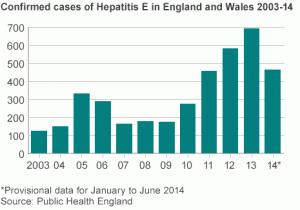 According to experts, one in every ten sausages and processed pork meat products on England and Wales carry risk of hepatitis E virus (HEV) infection if under-cooked.
According to experts, one in every ten sausages and processed pork meat products on England and Wales carry risk of hepatitis E virus (HEV) infection if under-cooked.
An abrupt rise has been observed in the amount of cases in England and Wales of hepatitis E virus according to scientists who are now are warning the government to take action, as people do not seem to realize the risk.
To prevent any chances of hepatitis E infection, sausages should be cooked for 20 minutes ate 70C to ensure the virus does not survive. Serious cases are rare, nevertheless, HEV can cause liver damage and even cause death.
Figures from the UK government show that there were 124 confirmed cases of hepatitis E back in 2003; in 2013 there were 691 cases. In the first half of this year (2014), already 461 cases were confirmed.
The infection carries symptoms that can include jaundice and tiredness, fever, vomiting, nausea, and severe abdominal pain.
 Most people get over the virus, but people with immune deficiency disorders or pregnant women may not. For these groups, the virus can prove to be fatal.
Most people get over the virus, but people with immune deficiency disorders or pregnant women may not. For these groups, the virus can prove to be fatal.
Richard Tedder, professor at University College London (UCL), comments that HEV is very common in the United Kingdom and that not all cases are noticed and recorded. “This virus is taking off within the pig herds from which this country sources its processed pig meat in sausages and pork pies,” he added. Tedder suggests that sausages should be “caramelized” before eating to ensure they do not represent health risks. Moreover, this warning should be ingrained in people just as everybody knows that it is possible to get salmonella from chicken, he said. People need to be cautious, however, the figure one of ten sausages must be interpreted correctly: this number come from a small survey of 68 sausages that is unlikely to represent the entire UK.
“Given what is known about the prevalence of high viraemia at the time of slaughter in the UK, a more representative figure would be about 1 in 100, or 1% of sausages, and any risk of infection can be alleviated by ensuring sausages are cooked thoroughly.”
Professor Tedder also noted that animal practices must change in terms of hygiene procedures so the virus progression stops. Furthermore, Dr. Harry Dalton, at the Royal Cornwall Hospital Trust, affirmed that the virus can also be caught from strawberries irrigated with infected water. “Shellfish in west Scotland and Tuscany had also infected people (…) in Asia and Africa, hepatitis E is more commonly transmitted by contaminated drinking water,” as reported on the BBC news website.
